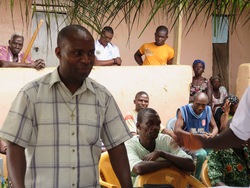
AFJN meeting with community in Brewaniase 09/25/2014
Fighting the Injustice of Land-Grabs in Africa
by Michael Sean Winters
In 1885, the great European powers met in Berlin to set the ground rules for their various colonization projects in Africa, divide up the continent into spheres of influence, and enact trade regulations for the exploitation of Africa’s vast resources.
There was a similar conference last week, in New York, but you did not read about it and it was held behind the closed doors of a corporate board room. And, the week before there was a similar conference in Amsterdam, and the week before that in London.
Imperialism today is no longer conducted by nation-states but, instead, by multi-national corporations but the essence of the saga is unchanged: A poor continent is being raped by powerful, wealthy Westerners.
Last week, I attended a briefing sponsored by the Africa Faith & Justice Network (AFJN) at their offices here in Washington, D.C. They wanted to tell those of us who attended about two recent trips members of their organization made to Africa and their on-going work there. Today, I would like to share what I learned about one of those trips.
Bahati Jacques and Melaura Homan-Smith went to the Volta region of Ghana in October to meet with local villagers and help them confront the consequences of a land-grab. Herakles Farms, a New York-based firm with which AFJN had tangled previously in neighboring Cameroon, had come into this region and did what land-grabbers do: They promised a lot of money, some of it up front, they promised they would drill wells for the people, build schools and clinics and roads, improve the standard of living, if only the farmers would sign a 99-year lease at $5 per hectare per year. A hectare is about two and one-half acres. Of course, the people of the Volta region did not get what they were promised. And, Herakles Farms, once they realized that the intrepid social justice advocates from AFJN were on the case, sold the lease to a British company, Volta Red, which has set up a mill to process palm oil.
Bahati said that “the verdict is out” on Volta Red but they met with the company’s lead staffer on the ground and it appears the company is willing to address the concerns AFJN raised. The business plan is less exploitative: Ghana has been a net importer of palm oil, which is like Saudi Arabia being a net importer of oil. The possibility exists that the mill will get enough oil without taking all the farmable land, and therefore be less likely to disrupt centuries-old patterns of agriculture and food production.
The more interesting meetings, however, were with local villagers. Coordinating their work with a local parish, St. Theresa, they met with some elders of different villagers and asked them to convoke meetings of the villagers. They went to half a dozen towns and, in each, explained how land-grabs happen, what can be done to prevent them in the first place, and how to minimize the damage once the land-grab has been done. “Prevention is key for land-grab,” Bahati says. “It is much harder to protect land once it is owned by a Western company.” Melaura added that in any land-grab, it is essential that the local people be shareholders in the venture, not just leaseholders.
The meetings were well attended and once the word got out, other chiefs from neighboring towns asked Bahati and Melaura to come and speak to their villagers. The man who served as an interpreter is now a full-blown activist!
Bahati and Melaura also connected local leaders with a law firm to protect their rights. Contract and lease negotiations are on-going. Many Western companies initially put enormous pressure on local landowners to sign lease agreements without legal counsel or, in the case with Herakles Farms, the company “provided” the locals with a lawyer who happened to work at the same firm as the lawyer representing the company.
The land-grab problem is not unique to Ghana. In Liberia, 64% of usable land is held by foreign corporations. 64%. In Tanzania, forty thousand people are being evicted from land they have lived on for all their lives because the royal family of Dubai bought the land to set up a private game preserve. This will devastate the nomadic peoples in the region, placing the grazing lands they and their ancestors have used for centuries behind the walls of the preserve. Similar tales can be told about most of the countries in Africa.
Working with the Symposium of Episcopal Conferences of Africa and Madagascar, AFJN hopes to conduct three day, continent-wide conference on land grabs. They are hoping each national bishops’ conference will send four or five people to the conference and that these participants will, in turn, be able to go back to their country and do what Bahati and Melaura are doing: Warn people about land-grabs and teach them how to prevent them, hire lawyers to re-negotiate lease agreements and contracts where the land-grab has already happened, call attention to this new-fangled imperialism, and support sustainable development projects. “In the 19th century,” Bahati says, “the European powers were only taking resources. Now, more people are dividing Africa up, all motivated by greed, and they are taking the land. It is much worse now than before.”
Here is a link to photos of Bahati and Melaura’s trip, which includes a further link to an article about their trip. AFJN is one of many small Catholic social justice efforts that operate on a shoe string budget but achieve a great deal of good in the world. Tomorrow I will look at the other trip they sponsored this autumn, dealing with Catholic Social Doctrine and good governance.













